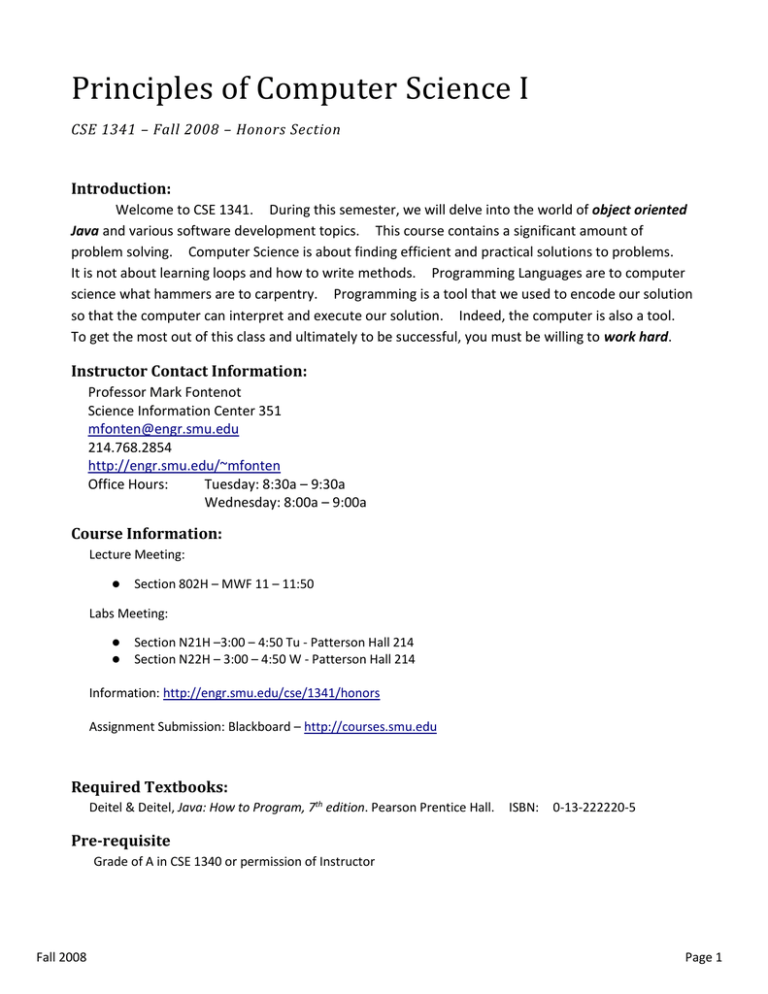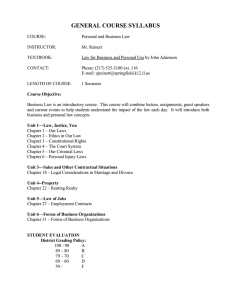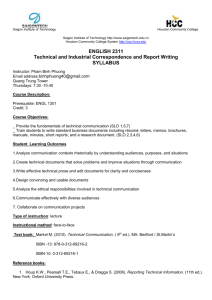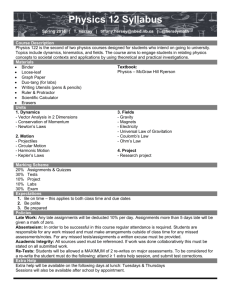
Principles of Computer Science I
CSE 1341 – Fall 2008 – Honors Section
Introduction:
Welcome to CSE 1341. During this semester, we will delve into the world of object oriented
Java and various software development topics. This course contains a significant amount of
problem solving. Computer Science is about finding efficient and practical solutions to problems.
It is not about learning loops and how to write methods. Programming Languages are to computer
science what hammers are to carpentry. Programming is a tool that we used to encode our solution
so that the computer can interpret and execute our solution. Indeed, the computer is also a tool.
To get the most out of this class and ultimately to be successful, you must be willing to work hard.
Instructor Contact Information:
Professor Mark Fontenot
Science Information Center 351
mfonten@engr.smu.edu
214.768.2854
http://engr.smu.edu/~mfonten
Office Hours:
Tuesday: 8:30a – 9:30a
Wednesday: 8:00a – 9:00a
Course Information:
Lecture Meeting:
Section 802H – MWF 11 – 11:50
Labs Meeting:
Section N21H –3:00 – 4:50 Tu - Patterson Hall 214
Section N22H – 3:00 – 4:50 W - Patterson Hall 214
Information: http://engr.smu.edu/cse/1341/honors
Assignment Submission: Blackboard – http://courses.smu.edu
Required Textbooks:
Deitel & Deitel, Java: How to Program, 7th edition. Pearson Prentice Hall.
ISBN:
0-13-222220-5
Pre-requisite
Grade of A in CSE 1340 or permission of Instructor
Fall 2008
Page 1
Method of Evaluation:
The final course grade in CSE 1341 will be based upon performance on various assignments such as exams,
homework assignments, programming assignments. Additionally, your attendance and active participation
in lecture will be reflected in your final grade. The percentage break-down is as follows:
Assignment
Percentage
Exams
25 %
Programming Projects
35 %
Interdisciplinary Project
25 %
Homework Assignments
10 %
Attendance and Active Participation
5%
Additional constraints on grade are as follows:
An average of less than 60% on exams will result in maximum grade of D in the course
An average of less than 60% on programming projects/assignments will result in maximum grade of
D in the course
The due dates for all assignments will be explicitly stated on each assignment and will be available on the
course website.
Final grades in this course are determined as follows unless constraints listed above are not met:
90 - 100 : A
87 - 89 : B+
80 - 86 : B
77 - 79 : C+
70 - 76 : C
67 - 69 : D+
60 - 66 : D
0 - 60 : F
Homework Assignments:
Homework assignments are usually assigned weekly. They can be downloaded and printed from the course
website listed above. Homework assignments are generally due on Friday of the week and must be
submitted in class before lecture starts.
Programming Projects:
Programming projects are usually due by 10:00 P.M. on Mondays. Generally, every Monday will have
some deliverable from a programming project due. Some weeks you will submit design documents and
others you will submit implementation files. It is extremely unlikely that you will be able to finish your
deliverables during your two hour lab period. However, your lab period is not the time to start your work
for the week. You should work on your assignments before lab and use lab as time to get clarifications and
explanations as needed. Various weeks will have pre-lab assignments that you must show your TA for
entry to lab that week.
Fall 2008
Page 2
These due dates are general guidelines.
Check each lab packet for specific due dates.
Programming projects must be submitted to Blackboard before the due date. After this time, Blackboard
will not allow any submissions. Only the professor can give an extension to this due date and it is typically
a 48 hour extension. Any extensions will incur a minimum 25% penalty on the grade.
Source code that does not compile will not be given any credit.
executable will have 10 points deducted from the grade.
Submissions of source code without an
Interdisciplinary Projects
A significant portion of your grade this semester will be based on your involvement, participation, and
performance on interdisciplinary projects where you will be placed on teams of students from ME 1202, EE
1382 and this course. The project will require your team to tackle an exciting engineering problem.
More information will be forthcoming about this during the semester.
Attendance Policy:
Because of the nature of this class, attendance of and participation in lecture is of the utmost importance.
Therefore, students are expected to attend class regularly. If a student is absent from class, it is that
students responsibility to make arrangements with the professor to make up any work missed or to ensure
that assignments are submitted on time or early. Late assignments will not be accepted except in extreme
instances. Any assignments that will be missed (including those due to university-sanctioned events) must
be completed before the due date. This includes lecture exams and homework assignments. Note that
five percent of the semester grade is based upon class attendance and active participation. This
attendance score will be determined based attendance and active participation in both lecture and lab.
Should a student be absent from a course lecture, it is the students responsibility to make alternative
arrangements to obtain any missed lecture notes, etc.
Outside Work:
This course will require a substantial amount of work to be done outside of both lecture and lab. The best
way to learn to problem-solve and to program is to sit down and do it. There will be several in-depth
programming assignments this will require substantial time commitments on your part. Some of these
projects may be collaborative in nature. It is not unreasonable to expect that you may spend (average) 10
– 12 hours/week on this course work outside of Lecture and/or Lab with some weeks peaking near 20
hours.
Here are some soft-skills that we hope to help you hone over the course of the semester:
Start Early (i.e. not waiting until the last minute to begin work on projects and assignments)
Work smart (i.e. using your time wisely)
Critical Analysis of problems
Academic Ethics and Collaboration:
You are expected to create, edit and print your own assignments and take tests without outside assistance.
All work is expected to be your own. In particular:
Fall 2008
You should never look at or review another person's work for any given assignment. This includes
looking at papers, solutions, or computer screens where another student's work is displayed.
Page 3
You should never give or receive solutions/answers to any questions or projects or any parts or
questions or projects. This includes but is not limited to source code, design documents,
homework, etc.
If you collaborate on any assignment for any reason unless specifically permitted by the instructor, you will
receive an F in the course and may be brought in front of the SMU Honor Council. The presumption
should be that collaboration is not permitted and collaboration should only take subsequent to explicit
instructions by the course instructor. It is your responsibility to know and understand the University's
Honor Code and the expectations for collaboration in this course. The instructor of this course reserves
the right to impose less severe penalties as seen fit.
Disability Accommodations:
If you need academic accommodations for a disability, you must first contact Ms. Rebecca Marin,
Coordinator of Services for Students with Disabilities (214-768-4563) to verify the disability and to establish
eligibility for accommodations. Then you should schedule an appointment your professors to make
appropriate arrangements.
Religious Observance:
Religiously observant students wishing to be absent on holidays that require missing class should notify
their professors in writing at the beginning of the semester, and should discuss with them, in advance,
acceptable ways of making up any work missed because of the absence. (See University Policy No. 1.9.)
Excused Absences for University Extracurricular Activities:
Students participating in an officially sanctioned, scheduled University extracurricular activity will be given
the opportunity to make up class assignments or other graded assignments missed as a result of their
participation. It is the responsibility of the student to make arrangements with the instructor prior to any
missed scheduled examination or other missed assignment for making up the work. (University
Undergraduate Catalogue)
Conduct Expectations:
Students should observe the following:
Fall 2008
Cell phones should be in vibrate/silent mode at all times during lecture. If your cell phone does not have
this feature, then it should be turned off. DO NOT, under any circumstances, answer your cell phone
during class.
Sending text messages, surfing the Internet, etc. is considered disrespectful and will be dealt with
accordingly.
Students should remain quiet during lecture so as to avoid disturbing other students
Page 4







